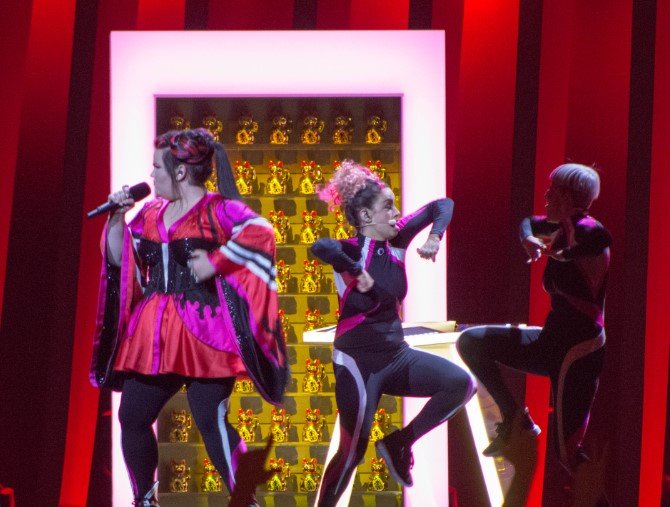Despite mounting calls for a boycott, Israel has been confirmed to participate in the 2025 Eurovision Song Contest. The decision has been reaffirmed by the contest’s new director, Martin Green, who made it clear that Israel’s involvement is not up for debate.
No Question About Israel’s Participation
Eurovision 2025 is just around the corner, but Israel’s participation remains under scrutiny. Following the ongoing political and military tensions in Gaza, some European nations have pushed for Israel’s exclusion from the event, citing the conflict. However, the new director of Eurovision, Martin Green, has firmly rejected these requests.
In a recent interview with the Euroverse Mysteries podcast, Green stated that Eurovision is about celebrating music and culture, not about political conflicts. “Eurovision is a contest between public broadcasters, not nations,” he emphasized. “Our goal is to create a space where the focus is on uniting people through music.”
This statement came in the wake of calls from certain quarters in Europe to implement a blanket policy excluding countries involved in ongoing military conflicts. While Green acknowledged the political pressures surrounding the event, he made it clear that the European Broadcasting Union (EBU) would not allow Eurovision to become a platform for political sanctioning.
The Political Tension at Eurovision
This decision follows a politically charged Eurovision 2024 contest, which saw tensions rise, particularly between Norway and Israel. The Norwegian delegation, led by Stig Karlsen, faced backlash for their behavior towards Israeli journalists during the event in Malmö. Despite initially agreeing to interviews, the delegation abruptly turned them down upon realizing the journalists were Israeli.

This incident became a focal point of discussion around the contest’s political neutrality. Some critics argued that Eurovision, which has always prided itself on being an inclusive celebration of diverse cultures, was being hijacked by political agendas. The Eurovision Song Contest has always maintained that it aims to separate music from geopolitics, but recent events have made that stance more difficult to uphold.
In a remarkable turn of events, Karlsen resigned from his position as head of Norway’s delegation following the 2024 contest, citing the political climate as one of the reasons for his departure. His actions led to increased pressure on the EBU to reconsider its approach to political controversies surrounding the event.
Green’s Response to the Boycott Movement
Martin Green, who took over as the contest’s director after the 2024 Eurovision, has handled the situation with a firm but empathetic stance. Green, known for his work on high-profile international events like the London 2012 Olympics, emphasized that Eurovision is about celebrating diversity and unity through music. He pointed out that this was the same spirit that had guided the contest for decades.
“Eurovision reminds us of what humanity can be at its best,” Green said. “It’s about what connects us—not what divides us.” This message came in response to growing calls for boycotts, with some European countries urging the EBU to follow the example set by other major international events and ban Israel’s participation due to the ongoing conflict in Gaza.
While Green made it clear that he understood the sensitivities surrounding the situation, he also underlined the importance of maintaining the integrity of Eurovision as an apolitical event. “Our job is to produce a contest where politics takes a backseat to music,” he reiterated.
Israel’s Eurovision Representative: A Symbol of Resilience
Yuval Raphael, Israel’s representative for Eurovision 2025, has become a symbol of resilience. Raphael, who was a survivor of the October 7, 2023, Hamas attack during the Nova festival in southern Israel, is set to perform on the Eurovision stage in 2025. His participation in the contest is a powerful statement of survival and strength, showing that even in the face of tragedy, the pursuit of artistic expression and cultural celebration continues.
Raphael, who won Israel’s “Rising Star 2025” finale, is expected to represent the country with a performance that will resonate deeply with viewers around the world. His inclusion in the contest serves as a reminder that Eurovision is about celebrating life and culture, even in times of conflict.
Eurovision’s Neutral Stance: Maintaining the Separation of Politics and Culture
The European Broadcasting Union (EBU) has been steadfast in its decision to allow Israel to participate in Eurovision 2025. The EBU recently received a letter from Spain’s public broadcaster requesting Israel’s ban from future contests, which was swiftly rejected. The EBU’s response reinforced its commitment to keeping Eurovision a platform for cultural exchange, rather than a political battleground.
In this context, the EBU’s stance on political neutrality seems more important than ever. The organization has faced intense scrutiny in recent years, especially after the 2024 contest in Malmö. However, Green’s leadership appears to be steering the organization toward a more inclusive and less politically charged future for Eurovision.
What’s Next for Eurovision?
With less than a year to go before the 2025 contest, all eyes are on how the EBU and its new director will continue to navigate the political challenges surrounding the event. While there is no doubt that Eurovision will remain a major cultural event, it remains to be seen whether further political pressure will affect the contest’s reputation.
For now, Israel’s participation seems assured, and Eurovision 2025 is poised to be another star-studded celebration of music and culture, free from the shadow of political influence. As Green emphasized, “It’s about connecting people, not dividing them.”
